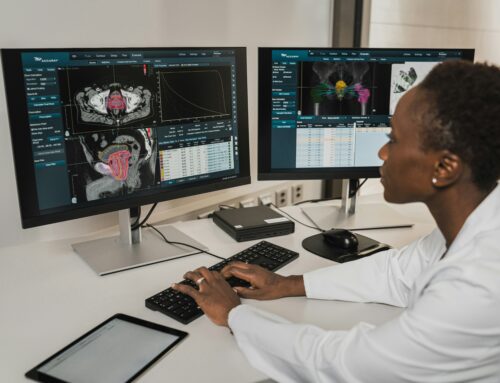Since the Covid-19 pandemic began, much literature has been published to give new insights related to patient management. For example, many articles illustrate how to implement new workflows that minimize the impact of clinical controls spread out over time on overloaded hospitals. Some others, instead, explore new ways to properly cover the healthcare needs not only during the COVID‐19 crisis, but also any other future pandemics. Based on the clinicians and other healthcare professionals’ observations, such work has already proven crucial; in particular, highlighting the relevance of case management during pandemic to coordinate care and attention besides patient education in self care in safety matters.
Let’s take for example the creation of guidelines for cancer care. During the first months of the COVID-19 pandemic, oncologists from Hospital General Universitario Gregorio Marañón (HGUGM) and the staff of the Spanish Breast Cancer Group (GEICAM) spent much effort to propose a document to facilitate medical decision-making for breast cancer patients in the critical pandemic context; this resulted in the “GEICAM Guidelines for the Management of Patients with Breast Cancer During the COVID-19 Pandemic in Spain“. These guidelines aimed to optimize the breast cancer (BC) patient treatment by BC subtype, management and care during the COVID-19 pandemic.
The GEICAM guidelines
Breast cancer is the most common cancer in women in Spain. Even during a pandemic, patients with cancer still require timely treatment and follow-up; however, hospitals are overwhelmed with infected patients and, if exposed, patients with BC are at higher risk of complications. Thus, health care providers need to evaluate each in-hospital visit to minimize pandemic-associated risks, while still maintaining adequate treatment efficacy. This set of guidelines explores available options for BC patient management and treatment in the COVID-19 pandemic context. Owing to the suddenness of this health crisis, healthcare professionals had to make decisions with little evidence at hand. These recommendations were mainly based on expert opinion, medical organizations’ and societies’ recommendations, and some published evidence; they aimed at being a useful tool to facilitate medical decision-making in this unprecedented context.
Learning from experience
Oncologists from the Hospital General Universitario Gregorio Marañón published these guidelines in July 2020. Fortunately, the pandemic situation has since improved by a great deal; however, it is always advisable to learn from experience and find opportunities in adversity. For example, both the cancer hospitals and the technology and data experts working together within the FAITH consortium could use these guidelines to improve the healthcare system even in the post-pandemic situation. In fact, the relevance of patient management during pandemics highlights the necessity to coordinate care and attention besides the current circumstances.
FAITH is developing and piloting a federated machine learning-based solution focused in healthcare for improving diagnosis of depression and anxiety in cancer survivors. We uphold that this tool can be very useful and have an additional value in the post pandemic period, providing an AI‐based clinical decision support system for cancer patients in similar situations, helping to minimize unexpected delays in medical care or medical surveillance. A true example of artificial intelligence focused on cancer survivorship!
Authors: Miguel Martín, María del Monte Millán, Tatiana Massarrah, and Sara López-Tarruella of the Hospital Gregorio Marañón (SERMAS).
References
- Martin, M., Guerrero-Zotano, A., Montero, Á., Jara, C., Filipovich, E., Rojo, F., Moreno, F., García-Sáenz, J. Á., Alés, J. E., Chacón, J. I., Cruz, J., Gimenez, J., Cruz-Merino, L., Algara, M., Santisteban, M., Tarruella, S. L., & GEICAM Spanish Breast Cancer Group Steering Committee (2020). GEICAM Guidelines for the Management of Patients with Breast Cancer During the COVID-19 Pandemic in Spain. The oncologist, 25(9), e1339–e1345. https://doi.org/10.1634/theoncologist.2020-0363.




